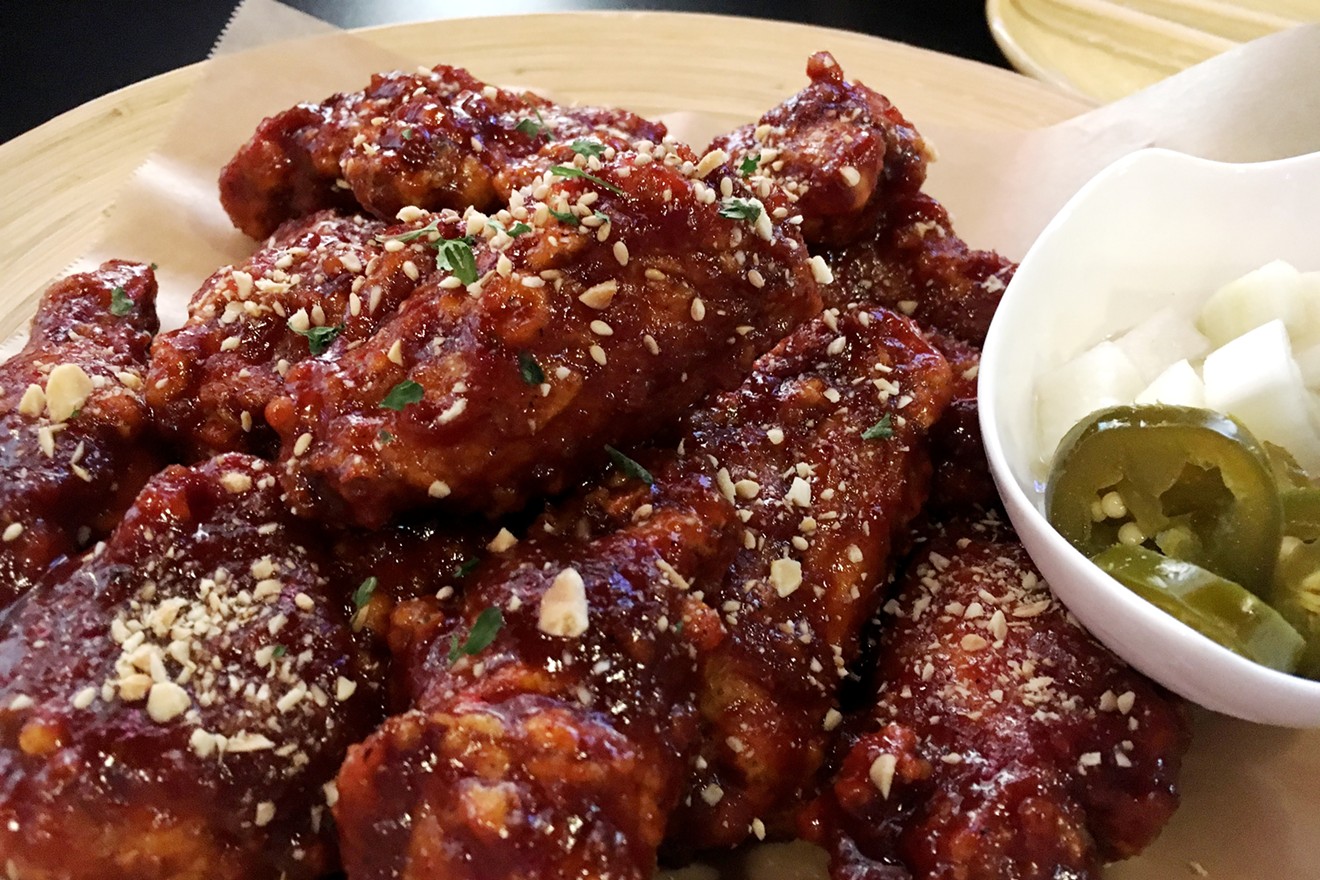We must have paused a little too long when the server at DMZ Pub set the platter of semi-dry squid on our table. The sight was intimidating: Flat like a deflated football and at least a foot long from tentacle tips to the top of its head (if squid actually have heads), the purplish-white sea creature presented a dilemma in how, exactly, we were supposed to eat it. Shallow scores along the length of the squid looked like they might be intentional perforations for separating the body and legs into manageable pieces, or they could just have been the result of the cooking process. The server didn’t give us a chance to prove our ineptitude; she grabbed the squid and deftly pulled it apart like a page of stamps, presenting us with a pile of strips and tentacles perfect for dipping in the brick-red sauce that came with it.
DMZ Pub, located at 2680 South Havana Street in Aurora (though the entrance is on Yale Avenue), serves squid — and many other types of Korean bar food — in several forms likely to confound novices to the cuisine. The semi-dry squid is like a seafood jerky that’s been lightly toasted over an open flame before being served; its salty, fishy, slightly grilled flavor turned out to be a great snack when served alongside a bowl of pistachio nuts (an unexpected accompaniment) and Korean beers and soju, a boozy grain-based beverage not unlike an effervescent sake.
If the notion of pull-apart squid jerky doesn’t exactly call your name, DMZ has plenty of more familiar items that are part of the anju (drinking food) tradition — most notably Korean fried chicken. DMZ falls into the “hof” — or Korean beer hall — category of eatery; it’s similar to nearby Funny Plus, but lacks the built-in burners at each table. Still, a platter of chicken wings makes for a great starter here whether you’ve been eating Korean cooking your whole life or you’re just getting around to exploring Aurora’s vast Korean restaurant scene.
DMZ serves fried chicken in several formats: wings or chicken pieces with or without sauce, and at more than one heat level. For the most crackly, crunchy experience, the un-sauced wings are the best option; they come with a side of dipping sauce so that you can customize as you eat. But lovers of messy, lip-burning bird will be drawn to the spicy-sweet wings. Let your server know you’re not afraid of heat, and you’ll be rewarded with a platter of sticky, chili-packed flappers that you can either augment with a side of pickled jalapeños or cool off with cubes of daikon radish.
Tteok-bokki is another common hof offering, made with fat rice cakes (chewy noodles about the size and shape of a AA battery) in an incendiary red stew that often includes hard-boiled eggs, ramen noodles and fish cake. DMZ makes several versions (spelled dduk bok ki on the menu), including one topped with cheese, another with “rose” sauce (the standard gochujang-based sauce cut with cream), and a third with beef bulgogi in a beef-based sauce. Go with the traditional tteok-bokki if you’ve never had it before; while the dish is available at several Korean restaurants in town, this is one of the finer examples.
DMZ opens at 4 p.m. daily, but if you want a loud and lively experience, go later on the weekend. Many of the dishes are served in simple, teflon-lined casserole pans and are meant for sharing, so bring a crowd and plan to relax over rounds of drinks. You’ll see other groups enjoying stone bowls piled with steamed mussels, platters of glazed pork belly sliced into bite-sized pieces, and bubbling pans of buddae-jjigae, a noodle stew that generally includes Spam and even sliced hot dogs, echoes of the original dish’s use of Korean War military rations.
American ingredients may have crept into Korean cuisine over the past several decades, but the food at DMZ maintains its national identity. The mother-daughter team that runs the eatery (the former works in the kitchen and the latter serves food and drinks) are happy to help out Westerners coming in for the first time, but most of the customer base comprises Koreans looking for a taste of home. Aside from the fried chicken, ramen and somen noodles make for easy entry points, as do fried rice, grilled meats and kimchi soups. Snails may seem like haute French cuisine, but they’re perfect bar food in Korean hofs like DMZ. Fried gizzards aren’t all that different from what you’d find at one of Aurora’s soul-food kitchens.
There’s not too much to DMZ other than the food and drinks. The dark dining room is punctuated with LED lighting that gives the place a purplish glow, and a small bar in the corner adds a few more seats. But the pub still stands as a shining example of Korea’s love for drinking and dining, something Denver dwellers also hold dear. So bolster your culinary courage with a few rounds of soju and then demonstrate your skill at dismantling a whole dried squid. Now that you know what to do, you can dive right in before your server has the chance.
Or just get sloppy with some saucy wings — a glorious bar-food tradition on either side of the globe.
[
{
"name": "Air - MediumRectangle - Inline Content - Mobile Display Size",
"component": "12017618",
"insertPoint": "2",
"requiredCountToDisplay": "2"
},{
"name": "Editor Picks",
"component": "17242653",
"insertPoint": "4",
"requiredCountToDisplay": "1"
},{
"name": "Inline Links",
"component": "18838239",
"insertPoint": "8th",
"startingPoint": 8,
"requiredCountToDisplay": "7",
"maxInsertions": 25
},{
"name": "Air - MediumRectangle - Combo - Inline Content",
"component": "17261320",
"insertPoint": "8th",
"startingPoint": 8,
"requiredCountToDisplay": "7",
"maxInsertions": 25
},{
"name": "Inline Links",
"component": "18838239",
"insertPoint": "8th",
"startingPoint": 12,
"requiredCountToDisplay": "11",
"maxInsertions": 25
},{
"name": "Air - Leaderboard Tower - Combo - Inline Content",
"component": "17261321",
"insertPoint": "8th",
"startingPoint": 12,
"requiredCountToDisplay": "11",
"maxInsertions": 25
}
]














